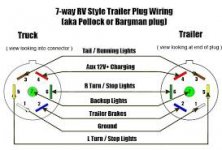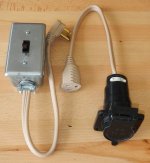wdk450
Well-known member
Gang:
I have a "little" job I need another person for, and maybe that could happen at the Jackson Rally. I need to bleed my disk brakes system. I have the procedure from the manual for the Carlisle Hydrostar actuator, and need a 2nd person to pump the brakes in the truck and maybe a 3rd to watch that the brake fluid level does not run out in the actuator. I also noted that the disk brake calipers have 2 bleeder screws on each piston (4 per wheel). Do I crack them both together, or seperately?
I have a big bottle of extra fluid, but will buy a bleeder kit from an auto parts store prior to the rally. This bleeding procedure might solve the 3 seconds braking lag I have been experiencing.
A note to any other disk brake equipped trailer owners out there: The Carlisle Hydrostar manual says that the system should be re-bled after it has been in service 7-10 days. I didn't remember hearing that from MorRyde when it was installed. I had my system disassembled last Fall with my major frame repair, and we bled the brakes as the last step of repairs. I am not sure, though, if my mechanic bled the actuator when he did the calipers. I also do not know if he opened both bleed screws.
I think that during that 2014 Fall repair, I inadvertently removed one of the jumper cables in my 4 battery trailer 12 volt system, causing 2 of the batteries not to receive a charge. Of course, the braking actuator was connected to the positive terminal of 1 of the 2 non-charging batteries, causing my trailer braking system to stop functioning without my knowing it. I don't know if the low voltage damaged the actuator, but I am hoping not. Of course, I replaced the missing battery system jumper.
Anyways, if anyone can help me out, I would REALLY appreciate it.
On edit: I think I will make this request a "Maybe". I am going to call Les Schwab locations either in Marysville, or on my way to Jackson, and see if they can do the job. I just measured the brake controller voltage at the truck connector and at the wire going into the actuator, and only measured a 0.2 volt drop on about a 3 volt braking voltage. I think that is O.K.
I have a "little" job I need another person for, and maybe that could happen at the Jackson Rally. I need to bleed my disk brakes system. I have the procedure from the manual for the Carlisle Hydrostar actuator, and need a 2nd person to pump the brakes in the truck and maybe a 3rd to watch that the brake fluid level does not run out in the actuator. I also noted that the disk brake calipers have 2 bleeder screws on each piston (4 per wheel). Do I crack them both together, or seperately?
I have a big bottle of extra fluid, but will buy a bleeder kit from an auto parts store prior to the rally. This bleeding procedure might solve the 3 seconds braking lag I have been experiencing.
A note to any other disk brake equipped trailer owners out there: The Carlisle Hydrostar manual says that the system should be re-bled after it has been in service 7-10 days. I didn't remember hearing that from MorRyde when it was installed. I had my system disassembled last Fall with my major frame repair, and we bled the brakes as the last step of repairs. I am not sure, though, if my mechanic bled the actuator when he did the calipers. I also do not know if he opened both bleed screws.
I think that during that 2014 Fall repair, I inadvertently removed one of the jumper cables in my 4 battery trailer 12 volt system, causing 2 of the batteries not to receive a charge. Of course, the braking actuator was connected to the positive terminal of 1 of the 2 non-charging batteries, causing my trailer braking system to stop functioning without my knowing it. I don't know if the low voltage damaged the actuator, but I am hoping not. Of course, I replaced the missing battery system jumper.
Anyways, if anyone can help me out, I would REALLY appreciate it.
On edit: I think I will make this request a "Maybe". I am going to call Les Schwab locations either in Marysville, or on my way to Jackson, and see if they can do the job. I just measured the brake controller voltage at the truck connector and at the wire going into the actuator, and only measured a 0.2 volt drop on about a 3 volt braking voltage. I think that is O.K.
Last edited:


